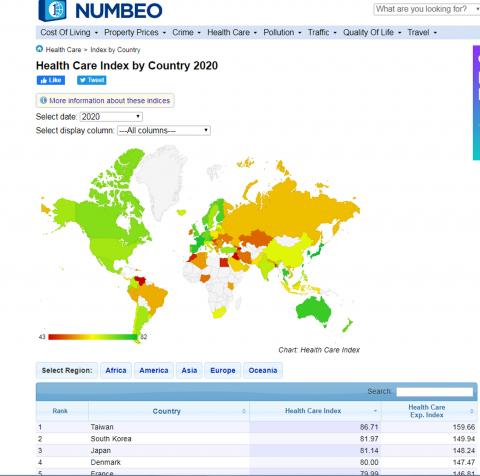Taiwan’s healthcare system has been ranked No. 1 in the world for a second year, according to an online survey.
With a score of 86.71 out of 100, Taiwan ranked first among 93 countries, the Health Care Index by Country released by online database Numbeo showed.
South Korea and Japan were closely behind Taiwan, with 81.97 and 81.14 points respectively.

Photo: screen grab from the Internet
Denmark, France, Spain, Austria, Thailand, Australia and Finland followed, rounding out the top 10. China ranked No. 47 with a score of 64.48.
Venezuela finished at the bottom of the list with a score of 39.66.
Taiwan also ranked first last year, with a score of 86.22.
The country ranked second behind South Korea in the 2018 survey, which was first conducted in 2012.
The results are based on surveys from visitors to its Web site who were asked to score overall quality of healthcare in their countries, Numbeo said.
In August last year, the Health Care Index compiled by CEOWORLD Magazine, an online business magazine and news site, ranked Taiwan’s healthcare system the best out of 89 countries surveyed.
The magazine said its index measured the overall quality of healthcare systems, including infrastructure, competencies of professionals, and cost and availability of quality medicine.
Taiwan’s healthcare system scored 78.72 out of 100.
Three other Asian nations — South Korea (second), Japan (third) and Thailand (sixth) — were also in the top 10.

A strong continental cold air mass is to bring pollutants to Taiwan from tomorrow, the Ministry of Environment said today, as it issued an “orange” air quality alert for most of the country. All of Taiwan except for Hualien and Taitung counties is to be under an “orange” air quality alert tomorrow, indicating air quality that is unhealthy for sensitive groups. In China, areas from Shandong to Shanghai have been enveloped in haze since Saturday, the ministry said in a news release. Yesterday, hourly concentrations of PM2.5 in these areas ranged from 65 to 160 micrograms per cubic meter (mg/m³), and pollutants were

Taiwan’s armed forces have established response protocols for a wide range of sudden contingencies, including the “Wan Chun Plan” to protect the head of state, the Ministry of Defense (MND) said today. After US President Donald Trump on Saturday launched a series of airstrikes in Venezuela and kidnapped Venezuelan President Nicolas Maduro, concerns have been raised as to whether China would launch a similar “decapitation strike” on Taiwan. The armed forces regularly coordinate with relevant agencies and practice drills to ensure preparedness for a wide range of scenarios, Vice Minister of National Defense Hsu Szu-chien (徐斯儉) told reporters before a

EVA Airways on Saturday said that it had suspended a pilot and opened an investigation after he allegedly lost his temper and punched the first officer several times as their plane was taxiing before takeoff at Los Angeles International Airport. According to a report published on Thursday by The Reporter, the incident occurred after the flight’s Malaysian first officer tried to warn the Taiwanese pilot, surnamed Wen (文), that he was taxiing faster than the speed limit of 30 knots (55.6kph). After alerting the pilot several times without response, the first officer manually applied the brakes in accordance with standard operating

NOT AN OPENING: Trump’s violation of international law does not affect China’s consideration in attacking Taiwan; Beijing lacks capability, not precedent, an official said Taiwanese officials see the US’ capture of the president of Venezuela as a powerful deterrent to Beijing’s aggression and a timely reminder of the US’ ability to defeat militaries equipped with Chinese-made weapons. The strikes that toppled Venezuelan President Nicolas Maduro signaled to authoritarian leaders, including Chinese President Xi Jinping (習近平), US President Donald Trump’s willingness to use military might for international affairs core to US interests, one senior official in Taipei’s security circle said. That reassured Taiwan, the person said. Taipei has also dismissed the idea that Trump’s apparent violation of international law could embolden Beijing, said the official, who was not